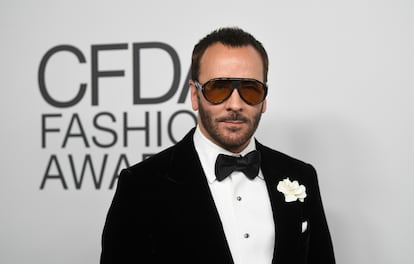Estée Lauder to buy Tom Ford for $2.8 billion in biggest deal of the year for luxury sector
The operation comes as high-end brands seek alternative avenues to the Chinese market, crippled by Covid disruptions


Tom Ford, the American designer-turned-filmmaker, will now have more time and money to imagine and produce stories. Estée Lauder, the cosmetics giant, has agreed to purchase the Tom Ford brand for $2.8 billion, representing the largest deal in its own history. The decision also consolidates an existing licensing agreement for Ford’s fragrances, skin care and cosmetics dating back to 2005. It is the most expensive deal in the luxury industry so far this year.
Oblivious to economic turmoil, the global luxury sector is shelling out large amounts to reconfigure itself. Estée Lauder, the world’s second largest cosmetics and fragrance company after France’s L’Oréal, will pay around $2.3 billion for the designer and filmmaker’s brand. The deal will be financed through a combination of cash, debt and $300 million in deferred payments, while the remaining $250 million will come from the German luxury company Marcolin, also from the luxury sector. Tom Ford’s fashion line for men, women and children will be licensed to Ermenegildo Zegna, his current partner for men’s wear.
Ford, founder of the brand, will continue to serve as creative supervisor after the deal is closed and up until the end of 2023, while Chairman Domenico De Sole, once Gucci’s chairman, will stay on as a consultant.
Executives at Estée Lauder, founded nearly 80 years ago in New York, have reported that the current licensing agreement with Tom Ford generates about $1 billion in revenue for the company a year, and that it expires in 2030. The deal comes at a time when high-end brands are looking for new avenues for growth, as business in China – once the powerhouse for luxury brands, with Russia taking a backseat – has become more difficult due to Covid restrictions and, in the case of Russia, due to the sanctions derived from the war in Ukraine.
The announcement comes after Bloomberg News reported in July that Tom Ford was exploring a possible sale. The powerful French group Kering, owner of the world’s leading luxury brands and which had long expressed interest in carrying out a transformational deal, has also been in talks to acquire Tom Ford, according to sources familiar with the negotiation. A representative for Kering, which is owned by billionaire François-Henri Pinault, declined to comment.
A lucrative sector in just a few hands
The heir to Estée Lauder, Ronald Lauder, 78 years old and son of the founder, has lately become a key factor in New York’s political life by supporting the Republican candidate for state governor, Lee Zeldin, with $11 million. Zeldin narrowly lost out to the Democrat Kathy Hochul in the recent midterm elections. New York City is also the home of another luxury industry mogul, François-Henri Pinault, who through Kering owns the prestigious Christie’s auction house. Last week, Christie’s sold the art collection of Microsoft co-founder Paul G. Allen for $1.6 billion, breaking all art market records.
At New York auctions, it is common to see Tom Ford, who is also a collector. The fashion icon undertook “the greatest challenge” of his life in the late 2000s when he decided to try his hand at film directing, and has since managed to transfer the refined elegance of his designs to celluloid, as demonstrated by his movies A Single Man and Nocturnal Animals. Ford has served as president of the powerful Council of Fashion Designers of America and contributes his designs on special occasions, such as one of the scenes that shaped the last major annual fashion show at the Metropolitan Museum in New York.
Tu suscripción se está usando en otro dispositivo
¿Quieres añadir otro usuario a tu suscripción?
Si continúas leyendo en este dispositivo, no se podrá leer en el otro.
FlechaTu suscripción se está usando en otro dispositivo y solo puedes acceder a EL PAÍS desde un dispositivo a la vez.
Si quieres compartir tu cuenta, cambia tu suscripción a la modalidad Premium, así podrás añadir otro usuario. Cada uno accederá con su propia cuenta de email, lo que os permitirá personalizar vuestra experiencia en EL PAÍS.
¿Tienes una suscripción de empresa? Accede aquí para contratar más cuentas.
En el caso de no saber quién está usando tu cuenta, te recomendamos cambiar tu contraseña aquí.
Si decides continuar compartiendo tu cuenta, este mensaje se mostrará en tu dispositivo y en el de la otra persona que está usando tu cuenta de forma indefinida, afectando a tu experiencia de lectura. Puedes consultar aquí los términos y condiciones de la suscripción digital.








































